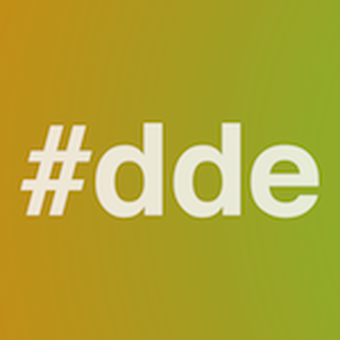My Attendance
Event Details
Alternative Studios: Design Education Changes in 2020
https://ojs.lboro.ac.uk/DATE/index
Guest Editors
Derek Jones, The Open University (UK)
Nicole Lotz, The Open University (UK)
Special Issue and Call for Papers
Title: Alternative Studios: Design Education Changes in 2020
Call for abstracts deadline: 28 February 2021
Full paper deadline: 30 April
Publication: June or October 2021 (dependant on submissions)
2020 saw some of the most radical and rapid changes to design education in decades. In response to the Coronavirus global pandemic, moves from physical to distanced modes of education have challenged even the most experienced educators (Green et al., 2020). Design and especially studio-based education are still very much physically located events and practices and the removal of such central elements of teaching practice have inevitably led to difficulties, negative reactions and even, some would argue, responses of grief (Brown, 2020).
In this changing context there have also been many examples of positive change and outcomes: students who might not contribute in a traditional setting are finding their voices and new confidences; alternative ways of teaching have also inspired alternative ways of learning ; design educators have generally re-engaged with reflecting on how it is they teach design and, especially, how their students experience learning. But the pedagogical consequences and boundaries of online and distance education are still not well understood (Jones, 2020; Marshalsey and Sclater, 2020).
Of course, not all institutions have experienced the same disruption. The effects of the last year have not been distributed evenly globally, economically, or socially. In some contexts, the business of dealing with crisis is a regular part of education curricula; in others, the disruption has led to near-collapse of teaching programs. Some of the divisions and dualities that have emerged are perhaps unhelpful: when presented as an ‘either-or’ of physical versus online, for example, we frame our inquiries and understandings in a similar way and fail to look beyond the duality into underlying causes and matters (Hodges et al., 2020).
What has started to emerge in some research is a recognition of the underlying properties and affordances of design education independent of mode of learning. The circumstances of 2020 have offered a unique and invaluable insight to what really matters in design education. The overriding aim of this Special Issue is to offer the design education community a chance to reflect and record what has been an exceptional event.
We seek scholarship and research that responds to the changes that have taken place in design education in 2020. Case studies are welcome but these should be more than descriptive reporting and contain, for example, some theoretical, critical, or reflective aspect to the work. The following outline questions are presented as potential starting points but work that develops other lines of inquiry, or critical reflection, are welcome.
-
What have we learned from 2020? What does it say about the past state of design education? How will this inform future thinking and teaching practice(s)?
-
Or has the pandemic simply reinforced existing and historical practices of design education? Has anything really changed in our institutional perspectives? Or have we simply taken existing practices into different modes without really asking about their suitability?
-
What have been the real challenges and problems; the underlying issues? What have been the emergent benefits? Have the benefits and problems been ‘evenly distributed’?
-
What changes have taken place in education contexts, beyond only curricular or institutional impacts? What socio-cultural shifts, if any, have emerged? Have students’ attitudes, expectations, and hopes changed?
-
What has changed in the last year that will not go back? What have we learned that has given us cause to change? What has been changed in this way and why? What might it suggest of other aspects of design education?
Call for abstracts / Call for Papers
Call for abstracts deadline: 28 February 2021
Full paper deadline: 30 April
Publication: June or October 2021 (dependant on submissions)
This an open call for abstracts and full papers.
The Call for Abstracts is for anyone wishing to test an idea or to get early feedback on a paper proposal. Abstracts should be not more than 200 words and submitted directly to the Guest Editors (derek.jones@open.ac.uk) by 28 February 2021.
If you intend to submit a paper but not an abstract then please let us know (derek.jones@open.ac.uk).
The general Call for Papers is for the following types of work:
-
Articles: (6000 words) reporting research, results and analysis, including critical theory and reflective pieces.
-
Case studies: (4000 words) reporting and describing specific cases and activities with suitable reflective scholarship.
-
Opinion and reflective pieces: (2-4000 words) reporting well-considered reflection and ideas arising from events of the past year.
Full papers should be submitted using the DTEIJ Journal website: https://ojs.lboro.ac.uk/DATE/about/submissions
References
Brown, J. B. (2020) ‘From denial to acceptance: a turning point for design studio in architecture education’, Distance Design Education [Online]. Available at https://distancedesigneducation.com/2020/05/11/from-denial-to-acceptance-a-turning-point-for-design-studio-in-architecture-education/ (Accessed 10 December 2020).
Green, J. K., Burrow, M. S. and Carvalho, L. (2020) ‘Designing for Transition: Supporting Teachers and Students Cope with Emergency Remote Education’, Postdigital Science and Education, vol. 2, no. 3, pp. 906–922 [Online]. DOI: 10.1007/s42438-020-00185-6.
Hodges, C., Moore, S., Lockee, B., Trust, T. and Bond, A. (2020) The Difference Between Emergency Remote Teaching and Online Learning [Online]. Available at https://er.educause.edu/articles/2020/3/the-difference-between-emergency-remote-teaching-and-online-learning (Accessed 15 December 2020).
Jones, D. (2020) ‘Creating Distance Design Courses’, [Online]. Available at https://distancedesigneducation.com/creating-distance-design-courses/.
Marshalsey, L. and Sclater, M. (2020) ‘Together but Apart: Creating and Supporting Online Learning Communities in an Era of Distributed Studio Education’, International Journal of Art & Design Education, vol. n/a, no. n/a [Online]. DOI: https://doi.org/10.1111/jade.12331 (Accessed 15 December 2020).


